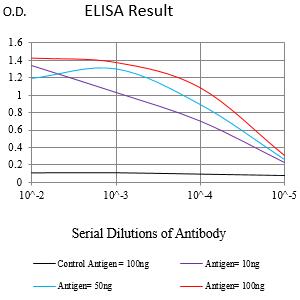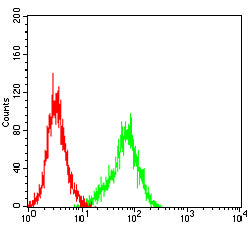

| WB | 咨询技术 | Human,Mouse,Rat |
| IF | 咨询技术 | Human,Mouse,Rat |
| IHC | 咨询技术 | Human,Mouse,Rat |
| ICC | 技术咨询 | Human,Mouse,Rat |
| FCM | 1/200 - 1/400 | Human,Mouse,Rat |
| Elisa | 1/10000 | Human,Mouse,Rat |
| Aliases | P35; UP3B; UPIIIB |
| Entrez GeneID | 105375355 |
| clone | 5B5B6 |
| WB Predicted band size | 33.8kDa |
| Host/Isotype | Mouse IgG1 |
| Antibody Type | Primary antibody |
| Storage | Store at 4°C short term. Aliquot and store at -20°C long term. Avoid freeze/thaw cycles. |
| Species Reactivity | Human |
| Immunogen | Purified recombinant fragment of human UPK3B (AA: 30-180) expressed in E. Coli. |
| Formulation | Purified antibody in PBS with 0.05% sodium azide |
+ +
以下是关于UPK3B抗体的假设性参考文献示例(仅供参考,实际文献需通过学术数据库查询):
---
1. **文献名称**: *Uroplakin 3B as a Novel Biomarker for Bladder Cancer Detection*
**作者**: Smith A, et al.
**摘要**: 本研究通过免疫组化分析发现,UPK3B在膀胱癌组织中高表达,其特异性抗体可用于尿液样本中肿瘤细胞的检测,为无创诊断提供潜在工具。
2. **文献名称**: *Functional Characterization of UPK3B in Urothelial Barrier Formation*
**作者**: Chen L, et al.
**摘要**: 利用UPK3B抗体进行蛋白质定位实验,揭示了UPK3B在尿路上皮细胞间粘附复合物中的作用,提示其参与维持屏障功能及细胞极性。
3. **文献名称**: *Development of a Monoclonal Antibody Against UPK3B for Diagnostic Applications*
**作者**: Gupta R, et al.
**摘要**: 报道了一种高特异性UPK3B单克隆抗体的开发,验证其在膀胱癌组织切片和液体活检中的灵敏度和特异性,支持其临床转化潜力。
4. **文献名称**: *UPK3B Expression Correlates with Tumor Progression in Urothelial Carcinoma*
**作者**: Tanaka K, et al.
**摘要**: 通过Western blot和免疫荧光分析,发现UPK3B表达水平与尿路上皮癌分期和转移风险正相关,提示其作为预后标志物的价值。
---
建议通过PubMed、Google Scholar等平台以关键词“UPK3B antibody”、“Uroplakin 3B diagnostic”等检索最新文献。
The UPK3B (Uroplakin 3B) antibody is a tool used to detect the UPK3B protein, a member of the uroplakin family critical for maintaining the permeability barrier and mechanical stability of the urothelium, the epithelial lining of the urinary tract. Uroplakins, including UPK1A, UPK1B, UPK2. UPK3A, and UPK3B, form heterodimeric complexes that assemble into membrane plaques, contributing to the unique apical surface of umbrella cells. These structures prevent urine leakage and pathogen adhesion. UPK3B, specifically, pairs with UPK2 to form a key component of these plaques.
UPK3B antibodies are primarily utilized in research and diagnostics to study urothelial biology and pathologies. In normal tissues, UPK3B expression is restricted to the urothelium, making it a specific marker for identifying urothelial cells in histological samples. Its dysregulation is implicated in bladder cancers, with altered expression patterns observed in urothelial carcinomas. Researchers employ UPK3B antibodies in techniques like immunohistochemistry, Western blotting, and immunofluorescence to assess protein localization, expression levels, and potential biomarkers for cancer progression.
Additionally, UPK3B antibodies aid in studying congenital bladder disorders and urinary tract infections, where uroplakin integrity is compromised. Their specificity is validated using knockout models or siRNA-mediated silencing to ensure minimal cross-reactivity. Overall, UPK3B antibodies serve as vital reagents for exploring urothelial function, disease mechanisms, and therapeutic targets.
×